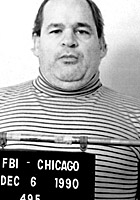VMT -- an alternative to gas tax
Posted by Craig Westover | 8:07 AM |
 I was pushed back by by the Chicago police search for Joey "the Clown" Lombardo (and who am I to deny Joey his air time), but I did a brief interview this morning with Don and Roma on WLS 890 on the topic of the Vehicle Miles Traveled fee that some states are considering as a replacement for the current flat per-gallon tax on gasoline. I wrote an article on this topic for the Heartland Institute.
I was pushed back by by the Chicago police search for Joey "the Clown" Lombardo (and who am I to deny Joey his air time), but I did a brief interview this morning with Don and Roma on WLS 890 on the topic of the Vehicle Miles Traveled fee that some states are considering as a replacement for the current flat per-gallon tax on gasoline. I wrote an article on this topic for the Heartland Institute.Although more drivers are on the road than ever before and more miles are being driven, increased fuel efficiency of vehicles has virtually flattened fuel tax revenues. As more alternative-fuel vehicles are added to the current mix of better fuel efficiency of standard vehicles and market penetration by hybrid vehicles, Oregon officials predict fuel tax revenues will begin declining by 2014.
Several states are considering shifting from per-gallon fuel taxes to mile-based tax systems, none more seriously than Oregon. The Oregon Department of Transportation (ODOT) is preparing to test a global positioning system capable of tracking a vehicle's location, recording in-state miles driven, and calculating a mileage-based tax payable at the gas pump.
As Don and Roma characterized it, it's a "sneaky little tax." Indeed it is in potential moreso that in the proposed Oregon implemtation, It opens up the potential for social engineering (determining a non-market-based differential between driving a SUV and a economy car) and raises privacy issues.
Initially, the GPS devices will only store the number of miles traveled, and they will only register whether a vehicle is inside or outside Oregon or in a congestion zone. Authorities will not be able to track in real time where a vehicle is or reconstruct where it has been.
Those limitations provide little reassurance, however, to privacy advocates such as David Sobel of the Electronic Privacy Information Center (EPIC), a public interest research center in Washington, DC. "Once technology is in place," he said, "it's virtually impossible to resist finding ways to use it."
The complete article can be found here.

<< Home